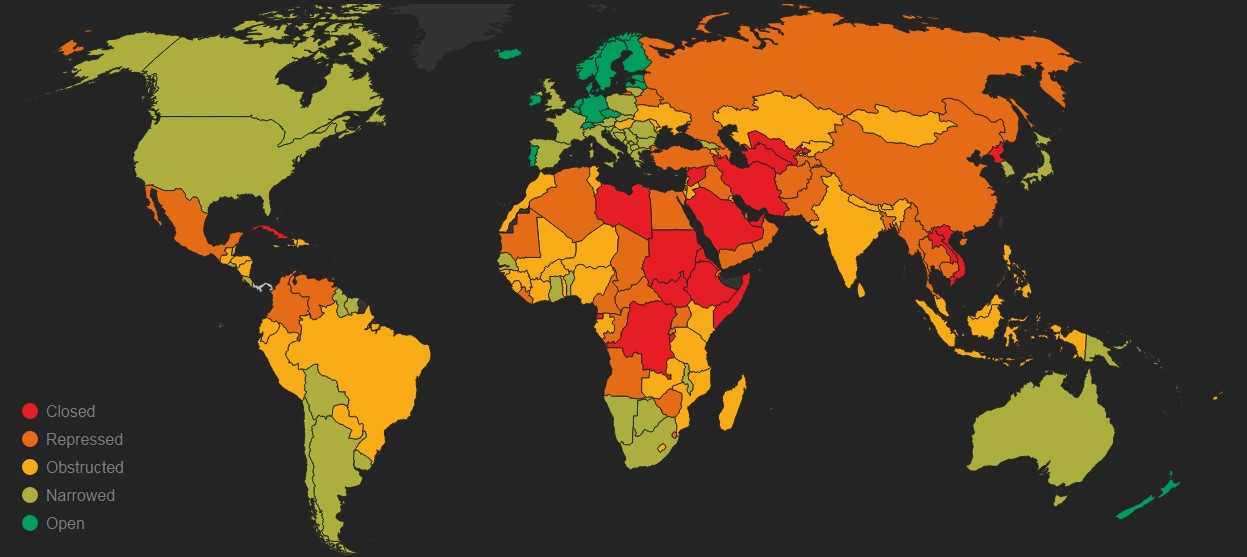May 10, 2017
Click here for a PDF version of this page.
Preserving and expanding space for civil society throughout the developing world is crucial to progress on global health. And yet over the last dozen years, that space has been squeezed by many governments.
CIVICUS, a South Africa-based international alliance of organizations devoted to monitoring and strengthening citizen participation, has documented the trend. Its April 2017 report is the first comprehensive analysis of civic space covering all UN Member States. It concludes that over half the world’s nations – 106 – face serious threats when asserting rights to expression and assembly, and when taking non-violent action to improve their societies. These include civil society actors speaking out on public health. The findings show that a majority of countries facing high incidence of HIV/AIDS, tuberculosis (TB) and malaria are among those ranked as “Obstructed,” “Repressed” (more severe), and “Closed” (most severe). The report highlights, in fact, that only 3 percent of the world’s population lives in countries where space for civic activism is truly open.

Source: CIVICUS
Civil society not only needs room to press authorities on basic health needs, but a role in shaping the solutions. That is particularly the case in the global efforts to confront the three devastating diseases of HIV/AIDS, TB and malaria. Civil society’s participation in health agenda-setting is particularly crucial when marginalized populations don’t have a voice – such as the groups most vulnerable to AIDS, children born HIV-positive, or children under age 5 who are especially vulnerable to malaria.
The Global Fund to Fight AIDS, Tuberculosis and Malaria (Global Fund), from its inception in 2002, has successfully integrated a role for civil society in its model. As an innovative public-private partnership, the Global Fund is poised to catalyze the community voice on major diseases.
A 2017 report on the Global Fund’s work highlights case studies on how civil society’s “expanded dialogue and participation in the development of grants are leading to more focused and responsive programming in many countries.” The report reveals how in Cambodia, “the national process for developing the country’s approach to TB involved a broad and innovative approach to consultation with communities affected by TB and led to a Global Fund grant that strongly reflects their needs and concerns. The Cambodian dialogue process has been adopted as a model in other countries.”
In Sierra Leone, “a new consortium of community-based organizations emerged from the country dialogue on HIV/TB, malaria and health and community systems strengthening proposals as a major voice for the rights of key populations and as an implementer of effective programming.”
Moreover, civil society played a central role in the September 2016 Global Fund Replenishment Conference in Montreal — where Japan increased its latest three-year pledge by 46 percent, the U.K. by 38 percent, Germany by 33 percent, and the European Union by 28 percent.
Some parts of civil society have raised considerations about Global Fund priorities – whether encouraging support of nations of middle income and higher, boosting a human rights focus all the more, or ensuring access to medicines at the lowest price. The Global Fund, incorporating civil society as a key stakeholder in its organizational strategy, is responsive to such concerns. On the last point, the Global Fund created the wambo.org portal, allowing governments and civil partners to purchase medicines based on price comparisons, empowering developing countries and their societies.
The Global Fund and U.S. bilateral programs like the President’s Emergency Plan for AIDS Relief (PEPFAR), the President’s Malaria Initiative (PMI) and USAID’s TB program as a collective effort have made great progress in the past 15 years against the three diseases — in part by getting civil society at the table to demand, help shape, and implement solutions. Continued U.S. resources for these programs are crucial, and cannot be taken in isolation. Funding for international affairs programs to foster development, pluralism, vital civil society voices, and more accountable and democratic governance are important, too. Under such a strategy, PEPFAR, PMI, and the Global Fund would achieve even more progress toward ending epidemics.
